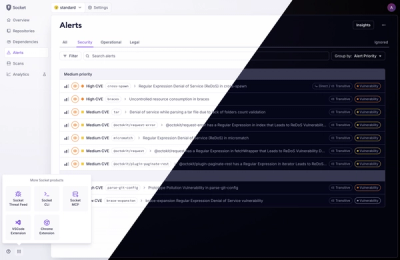
Product
A Fresh Look for the Socket Dashboard
We’ve redesigned the Socket dashboard with simpler navigation, less visual clutter, and a cleaner UI that highlights what really matters.
sniffer is a autotest tool for Python_ using the nosetest_ library.
NEW: sniffer can now be customize to run anything, see 'Advanced Usage'.
Sniffer will automatically re-run tests if your code changes. And with another third-party library (see below), the CPU usage of file system monitoring is reduced in comparison to pure-python solutions. However, sniffer will still work without any of those libraries.
.. _Python: http://python.org/ .. _nosetest: http://code.google.com/p/python-nose/
I (@jeffh) am looking for a new maintainer to carry on this project to new heights. I'm currently leaving this project on maintance mode (respond to issues, merge pull requests), but I'm not dedicating most of my free time towards this project.
Contact me on twitter (@jeffhui) or via email if you're interested in taking over the helm of this project.
To install::
pip install sniffer
Simply run sniffer in your project directory.
You can use sniffer --help for options And like autonose_, you can pass the nose
arguments with -x prefix: -x--with-doctest or -x--config.
The problem with autonose_, is that the autodetect can be slow to detect changes. This is due to the pure python implementation - manually walking through the file system to see what's changed [#]_. Although the default install of sniffer shares the same problem, installing a third-party library can help fix the problem. The library is dependent on your operating system:
If you want support for other notification systems, you can install:
.. [#] This has been resolved in subsequent autonose versions, using watchdog. .. _nose: http://code.google.com/p/python-nose/ .. _easy_install: http://pypi.python.org/pypi/setuptools .. _pip: http://pypi.python.org/pypi/pip .. _autonose: http://github.com/gfxmonk/autonose .. _pyinotify: http://trac.dbzteam.org/pyinotify .. _pywin32: http://sourceforge.net/projects/pywin32/ .. _MacFSEvents: http://pypi.python.org/pypi/MacFSEvents/0.2.1 .. _gntp: https://github.com/kfdm/gntp/ .. _Growl: http://growl.info .. _py-notify: http://home.gna.org/py-notify .. _LibNotify: http://developer-next.gnome.org/libnotify/ .. _osxnotify: https://github.com/tomekwojcik/osxnotify-python .. _libosxnotify: https://github.com/tomekwojcik/libosxnotify
Don't want to run nose? You can do whatever you really want. Create a scent.py file in your current working directory. Here's an example of what you can do so far:
.. code-block:: python
from sniffer.api import * # import the really small API import os, termstyle
pass_fg_color = termstyle.green pass_bg_color = termstyle.bg_default fail_fg_color = termstyle.red fail_bg_color = termstyle.bg_default
watch_paths = ['.', 'tests/']
@file_validator def py_files(filename): return filename.endswith('.py') and not os.path.basename(filename).startswith('.')
@runnable def execute_nose(*args): import nose return nose.run(argv=list(args))
And that's the basic case. Nothing too fancy shmanshe. You can have multiple file_validator and runnable decorators if you want.
There is also support for selecting a runnable function by file validator. Useful if you want to run nose for Python files, mocha for JavaScript files, and csslint for CSS. Or any other combination you can come up with. For example:
.. code-block:: python
# Here we instruct the 'python_tests' runnable to be kicked off
# when a .py file is changed
@select_runnable('python_tests')
@file_validator
def py_files(filename):
return filename.endswith('.py') and not os.path.basename(filename).startswith('.')
# Here we instruct the 'javascript_tests' runnable to be kicked off
# when a .js file is changed
@select_runnable('javascript_tests')
@file_validator
def js_files(filename):
return filename.endswith('.js') and not os.path.basename(filename).startswith('.')
@runnable
def python_tests(*args):
import nose
return nose.run(argv=list(args))
@runnable
def javascript_tests(*args):
command = "mocha tests/js-tests.js"
return call(command, shell=True) == 0
This will run the nose for modifications to Python files and mocha when JavaScript files are changed.
If you want to run another unit testing framework, you can do so by overriding sniffer.Sniffer,
which is the class that handles running tests, or whatever you want. Specifically, you'll want to
override the run, method to configure what you need to be done.
The property, test_args, are arguments gathered through --config=blah and -x.*
configuration options. You should perform you imports inside the function instead of outside,
to let the class reload the test framework (and reduce possibilities of multiple-run bugs).
After subclassing, set sniffer_instance parameter to your custom class when calling run or main.
For linux, there is an exception that is sometimes thrown when terminating.
Currently the program only looks for changes in the current working directory. This isn't the best solution: it doesn't understand how changes to your source code affects it.
FAQs
An automatic test runner. Supports nose out of the box.
We found that sniffer demonstrated a healthy version release cadence and project activity because the last version was released less than a year ago. It has 1 open source maintainer collaborating on the project.
Did you know?

Socket for GitHub automatically highlights issues in each pull request and monitors the health of all your open source dependencies. Discover the contents of your packages and block harmful activity before you install or update your dependencies.

Product
We’ve redesigned the Socket dashboard with simpler navigation, less visual clutter, and a cleaner UI that highlights what really matters.

Industry Insights
Terry O’Daniel, Head of Security at Amplitude, shares insights on building high-impact security teams, aligning with engineering, and why AI gives defenders a fighting chance.

Security News
MCP spec updated with structured tool output, stronger OAuth 2.1 security, resource indicators, and protocol cleanups for safer, more reliable AI workflows.